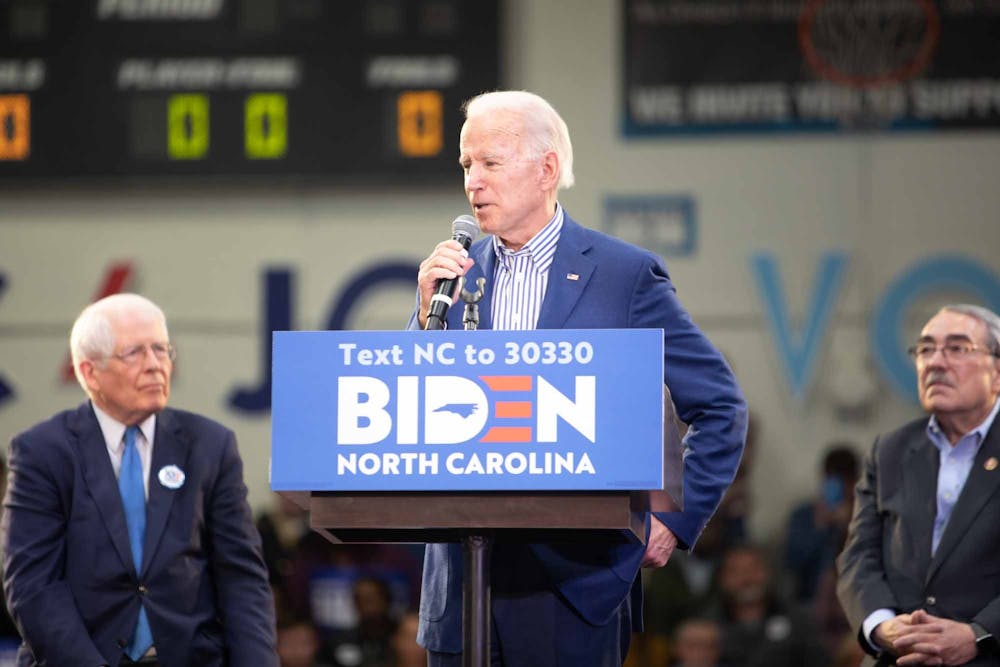The four early states — Iowa, New Hampshire, Nevada and South Carolina — got their fair share of attention, he said, but North Carolina mostly only heard from candidates through advertisements.
But he said this will likely change heading into November as North Carolina becomes a major battleground state.
“If North Carolina isn’t competitive, then something is amiss in the general election,” Bitzer said.
Voters across Orange County said on Tuesday that they cared about issues ranging from environmental justice to health care. North Carolina voting on Super Tuesday, however, didn't bring any of these issues to the forefront in candidates' minds.
“We’ve got a pretty clearly divided Democratic Party, and the candidates that are either center-left or left have some very clear policy agendas," Bitzer said. "So they’re pretty much sticking to those policy stances, maybe hoping that North Carolinians move into their direction rather than work toward accommodating a specific stance.”
Rob Schofield, director of NC Policy Watch, said Super Tuesday has essentially turned into a small national primary, but that doesn't mean North Carolina got the spotlight it hoped for.
“It’s a crazy aspect of the American primary system that people spend months walking through the cornfields of Iowa and the snowdrifts of New Hampshire, and then it’s just this mad dash that goes on," he said. "Especially when it’s today when we have 15 or 16 different venues voting across the country, it’s pretty tough to devote a whole lot of time to any particular state.”
Many voters in Orange County said they were looking for a candidate that could beat Donald Trump, but opinions across the state differed on who that would be. Orange County was a close race that eventually went to Biden, and four counties in the mountains went for Sanders.
Some voters, like Alicia Snavely who moved to North Carolina 12 years ago, weren't sure who they would be voting for until Tuesday because of the large number of candidates in the race.
“Because it was such a wide berth of candidates, I kind of wanted to see who was going to drop out at the last minute so that I didn’t waste my vote," she said.
Schofield said the size of the candidate pool made it difficult for some of them to stand out.
"The reality is I don’t actually think there’s that much difference between the policies of the various candidates," he said. "It’s come to more of an issue of who you like personally, whose style you like."
To get the day's news and headlines in your inbox each morning, sign up for our email newsletters.
Jim Beach, a Carrboro resident, said he's not sure what's going to happen, but he's hopeful.
"It's clear the future is very uncertain, but things tend to work out more often than they don't," he said when voting on Tuesday. "I don't know what's going to happen. I feel like all I can do is give it my best shot."
After Tuesday, North Carolina's choice in November is up in the air. The state has changed a lot since 2016: it's more diverse and has more unaffiliated voters, solidifying its role as a swing state.
And voters like Carrboro resident Suzanne Morrah, who voted on Tuesday, are looking forward to seeing what happens.
“Just like everybody else, I’m excited to see who comes out of the Democratic field," she said. "And I will passionately support whoever that is.”
@ampogarcic
@DTHCityState | city@dailytarheel.com
Meredith Radford, Gabriella Gibson, Maddie Ellis and Grace O'Callaghan contributed reporting.
Anna PogarcicAnna Pogarcic is the editor-in-chief of The Daily Tar Heel. She is a senior at UNC-Chapel Hill studying journalism and history major.





